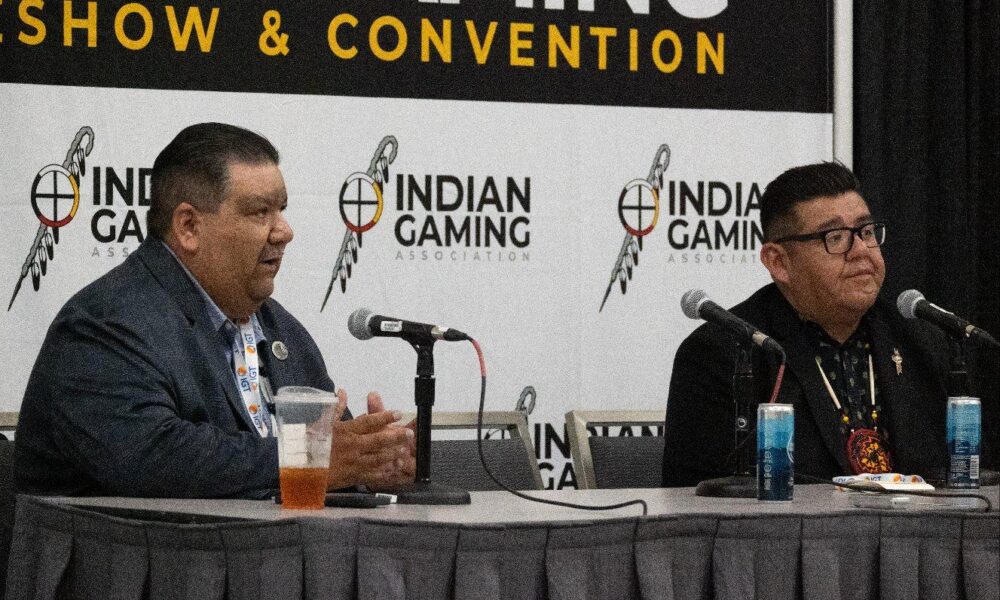The chairman of the California Nations Indian Gaming Association issued a clarion call to U.S. tribal leaders Tuesday about the threats they’re facing from the Trump administration, unregulated gambling, and legal loopholes exploited by online gaming and sweepstakes casinos.
While the session at the Indian Gaming Tradeshow & Convention in San Diego was titled “Under Siege: The Growing Threats to Tribal Gaming in California,” James Siva’s message resonates with tribes across the country.
The session also featured Isaiah Vivanco, chairman of the Soboda of Luiseno Indians in California, and was moderated by Susan Jensen, executive director of Siva’s CNIGA. They delved into the challenges to their sovereignty, market exclusivity, and long-term economic stability.
Siva lamented a decision handed down recently by the Bureau of Indian Affairs that temporarily rescinded a decision by the Biden Administration to allow gaming by the Scotts Valley Band of Pomo Indians on a 160-acre site in Vallejo, 30 miles northeast of San Francisco. The issue involves taking land into trust for tribes.
“Having that landmark decision happening, then having it seemingly reversed, shows this new administration is willing to make radical changes very quickly. Staffing has been reduced at the Department of the Interior and Bureau of Indian Affairs and these will have long-lasting effects, even if your particular tribe isn’t feeling them yet. They’re coming and they’ll radically affect how we operate. How many losses are we going to have? And will they outweigh the wins?”
Siva said his biggest worries about the Trump administration are the uncertainty about and the alacrity of what they’re doing. Tribes that need to gather support are unable to move that quickly to respond.
“Those things take time and Indian country isn’t built to move with the same speed as the Administration,” Siva said. “We need to change our process to react and fight in the same manner they’re moving. I don’t know if we’re ready for that. But we need to be, because everything is changing daily.”
Even Democrats are a threat, Siva said. In California, Gov. Gavin Newsom is the most pro-tribal governor they’ve had, but under his watch, there have been more compact disputes than with any other governor, Siva said.
Vivanco said tribes need lobbyists. California is a Democratic state, while Washington, D.C., is controlled by Republicans, so that it’s important to reach out to Republicans in a position to advocate for tribes.
Jensen complained that California card rooms violate the state constitution and while they’ve been punished with federal fines for money-laundering violations, they’re licenses aren’t jeopardized. Tribal casinos would get shut down if they did anything nefarious, she added.
Tribes are facing a long legal fight to deal with cardrooms that will likely go before the California Supreme Court, Siva said.
“We continue to see them operate and advertise themselves as casinos and we continue to see our market exclusivity and overall range diminished by them,” Siva said. “They’re some of the biggest violators in the state, with multiple FinCEN violations over a number of years and yet nothing is happening. They pay the money and continue operating.”
Card rooms aren’t the only concern.
Out of what Siva said came from nowhere are sweepstakes casinos that have built a multi-billion industry in just a few years. They’re taking away far more resources from tribes than the cardrooms.
“They’re fully in our focus right now and they have a huge target on their back. What they’re doing is illegal gaming, point blank, period. Every time I get a microphone, I make sure to stand up and hit them as hard as I can. They’re operating illegally in our state and we will do whatever we have to go after them, whether it’s through the payment processors or the state legislature or the state Attorney General. No one knows how to stop them, because it’s so new and grown to such a size already. It’s probably the biggest threat we face.”
Siva said sports betting operators who were behind a 2022 referendum in California to circumvent tribes and gain a foothold in outline sports wagering now realize their path is through the tribes.
“Getting that message to these sweepstakes groups is very difficult, because there’s not a single company,” Siva said. “There’s a company underneath a company. It’s not straightforward, like going to talk to DraftKings or FanDuel or BetMGM.”
Siva said another big threat is the Commodity Futures Trading Commission, which is considering a rule to enable the sports prediction market that effectively legalizes wagering nationwide, even in states where it’s not legal, such as California.
“What they’re trying to do is move sports betting under the regulatory authority of this Commission,” Siva said. “Sports betting, which is traditionally called event markets, can be viewed as a prediction market and a tradable commodity. That would allow online sports betting to go into any jurisdiction, regardless of state law and state constitutions. Even states that have been anti-gaming forever, like Texas and Utah, can online sports betting there tomorrow if this rule goes through.”
Siva said tribes spent hundreds of millions of dollars to fight sports betting operators in the 2022 referendum that failed overwhelmingly, “but all of that could go away in a second if this is allowed to go through. They would access the California market immediately, regardless of tribal exclusivity and any restrictions in the California constitution. It’s one of the biggest threats we’ve ever faced and it’s happening so quickly and outside our scope of normal expertise.”
Opponents, which includes tribes and the American Gaming Association, will testify on the proposed rule at the end of April, Siva said.
If the Commission sides with the operators, Siva said he expects FanDuel and DraftKings to develop that model as well.




